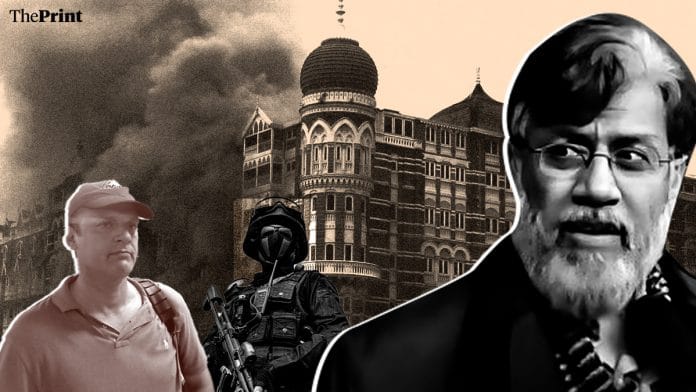New Delhi: Submitting that the extradition treaty’s provision to avoid double prosecutions for the same offences doesn’t apply in his case, the US government urged the Supreme Court to reject Tahawwur Hussain Rana’s plea against his handover to Indian agencies.
New Delhi has sought the extradition of Rana, a Canadian national of Pakistani origin, for his involvement in the 2008 Mumbai terror attack that claimed the lives of at least 174 people and left more than 300 others injured.
In a detailed counter filed by Solicitor General Elizabeth B. Prelogar on 16 December, the US government has countered Rana’s argument that Article 6(1) of the India-US extradition treaty and its reading by prosecutors during the plea bargain of his former aide and co-accused David Coleman Headley doesn’t apply in his case.
Prelogar filed the response after Rana moved a review petition in the Supreme Court seeking a review of the orders allowing his extradition passed by federal district courts and upheld by the US Courts of Appeals.
A former doctor with the Pakistan Army, Rana migrated to Canada in 1997 and then to the US, where he set up an immigration firm that Indian agencies say was used as a cover for Lashkar-e-Taiba (LeT) terrorist David Headley to recce key buildings for the deadly terror attack in Mumbai.
The Federal Bureau of Investigation (FBI) had arrested Rana within less than a year for allegedly providing material support to Headley. While Headley was convicted for his role, Rana, in 2011, was acquitted due to a lack of adequate evidence.
However, the duo was convicted for an aborted attack plan on Danish paper Jyllands-Posten following which Rana was sentenced to 14 years of imprisonment in January 2013. He was released from prison on 10 June 2020, but was re-arrested the next day based on India’s extradition request.
Also Read: Properties unrelated to crime can’t be attached under PMLA, says Kerala High Court
‘Govt’s position in Headley case not applicable’
In her submission Monday, Solicitor General Prelogar argued that Rana’s claim that his extradition should be barred based on the ‘non-bis in idem’ provision in the extradition treaty does not hold ground and the top court should reject the claim, as was done by lower courts in the past.
The principle of ‘non-bis in idem’ bars the prosecution of a person for a crime more than once, and Article 6(1) of the India-US extradition treaty provides this relief. “Extradition shall not be granted when the person sought has been convicted or acquitted in the Requested State for the offense for which extradition is requested,” the article states.
“Petitioner renews his claim (Pet. 19-26) that the Treaty’s non bis in idem provision bars his extradition to India on charges relating to the terrorist attacks in Mumbai in November 2008. The lower courts all correctly rejected that claim, and the court of appeals’ decision does not implicate any disagreement warranting this court’s review. This court has previously denied certiorari on a similar claim. It should do the same here,” Prelogar argued.
On Rana’s argument relying on the US government’s position on the extradition plea for Headley, Prelogar countered that his argument is “both misplaced and mistaken” because in that case, the then US attorney was “describing the plea agreement, not the treaty itself”.
“Third, petitioner contends that the government’s position during Headley’s plea proceedings judicially estops the government from arguing here that the treaty permits petitioner’s extradition. Petitioner’s reliance on Headley’s plea agreement, in which the government had agreed not to extradite Headley for his ‘offenses, including conduct within the scope of those offenses,’ is misplaced,” she further argued.
“Petitioner is also mistaken in contending that the government is estopped from extraditing him by the US Attorney’s statement during Headley’s plea hearing. At that hearing, the US Attorney described a provision in Headley’s plea agreement as “say[ing] if the conduct is conduct within the scope of those offenses for which he has been convicted in accordance with the plea, then according to the treaty, he would not be extradited”,” she countered.
Languishing in a Los Angeles prison since his re-arrest in June 2020, Rana’s review petition is his last chance to avoid extradition to India. “Absent action from this Court, he will be shipped to India, where – if he survives pretrial detention – he will face the daunting prospect of trial, conviction, and a death sentence,” his counsels had argued in the writ moved last month.
In October, ThePrint reported that Rana’s extradition to face trial in the Mumbai terror attack cases probed by the National Investigation Agency (NIA) and the Mumbai Police seemed “imminent”.
Meanwhile, the US Solicitor General argued that the Supreme Court would be a “poor vehicle” to consider review of judgements passed by the lower courts, because it is not clear whether Rana would be entitled to relief from extradition even if the court decides to settle the matter in his favour.
“The government does not concede that all of the conduct on which India seeks extradition was covered by the government’s prosecution in this case. For example, India’s forgery charges are based in part on conduct that was not charged in the US: petitioner’s use of false information in an application to formally open a branch office of the Immigration Law Center submitted to the RBI,” she argued.
“And it is not clear that the jury’s verdict in this case—which involves conspiracy charges and was somewhat difficult to parse—means that he has been ‘convicted or acquitted’ on all of the specific conduct that India has charged.”
Rana is sought in India for as many as nine charges such as conspiracy, waging war against the Government of India, conspiring to wage war against it, forgery for the purpose of cheating, using as genuine a forged document or electronic record, murder, committing a terrorist act, conspiring to commit a terrorist act, and membership in a terrorist gang, according to the Solicitor General.
(Edited by Tony Rai)






